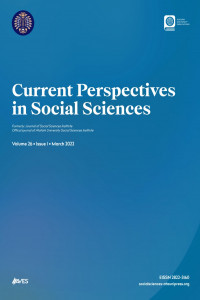Toward a Postcolonial Storytelling: Deciphering the Eastern Storytelling Conventions in Salman Rushdie’s TwoYears Eight Months and Twenty-Eight Nights
Dunia (world), Ibn Rush, jinn, Salman Rushdie, Shahrazad
___
- Adıgüzel, T. F. (2008). Oral narrating tradition of the Arab world: A source of inspiration for the miniature paintings of Hariri’s maqamat. Dokuz Eylül Üniversitesi, Sosyal Bilimler Enstitüsü Dergisi, (24), 105–120.
- Appignanesi, L., & Sara, M. (Eds.) (1990). The Rushdie file. Syracuse University Press.
- Colligan, C. (2002). “Esoteric Pornography”: Sir Richard Burton’s Arabian Nights and the Origins of Pornography. Victorian Review, 28(2), 31–64. [CrossRef]
- Maddocks, F. (2016). An interview with Rushdie. The Guardian. Retrieved from http://www.theguardian.com/books/2015/sep/06/salman-rushdie-inter view-two-years-eight-months-and-28-nights-observer-the-funniest-of-my-novels. Accessed: 27.03.2019.
- Reece, S. (2015). Orality and literacy: Ancient Greek literature as oral literature. In D. Schenker & M. Hose (Eds.), Companion to Greek literature (pp. 43–57). Blackwell Publishing.
- Oxford English Dictionary. (n.d.). Retrieved from https://en.oxforddictionaries.com/definition/jinn. Accessed o 01.10.2019. Rushdie, S. (1991). Imaginary homelands. Granta Books.
- Rushdie, S. (2015). Two years eight months and twenty-eight nights. Jonathan Cape.
- Slemon, S. (2015). Magic realism as post-colonial discourse (pp. 9–24). https://canlit.ca/canlitmedia/canlit.ca/pdfs/articles/canlit116Magic(Slemon).pdf
- Warner, M. (2011). Stranger magic: Charmed states and the Arabian nights. Chatto & Windus.
- Başlangıç: 2003
- Yayıncı: Atatürk Üniversitesi
Feriba Vefi, Roman ve Öykülerine Genel Bir Bakış
Disillusionment and Silence in British Trench Poems: Voices from World War I
Birinci Dünya Savaşı Sürecinde ve Sonrasında Bursa ve Çevresinde Ermeni Faaliyetleri
Türkiye’de Gençlerin Sağlığa Erişimi Ne Ölçüde Karşılanıyor?
What Makes an Immigrant Prisoners Satisfied? The Case of Afghans in Turkey
Yükseköğretim Kurumları Özelinde Öğrenci Hareketliliği
İyimserlik Ölçeği: Geçerlik ve Güvenirlik Çalışması “Revizyon”
Müge YILMAZ, Abdullah ALDEMİR, Seher BALCI ÇELİK
Antik Çağ’da Phûsis ve Etik: Platon, Aristoteles ve Stoacılar
